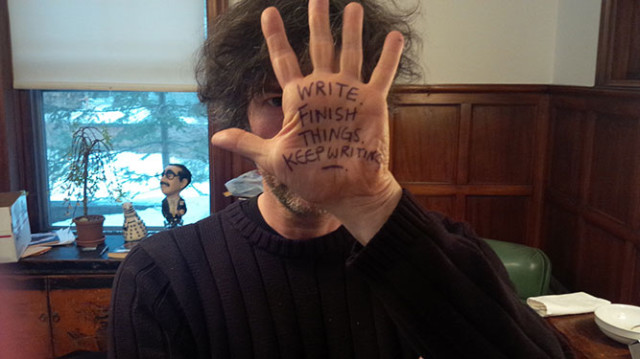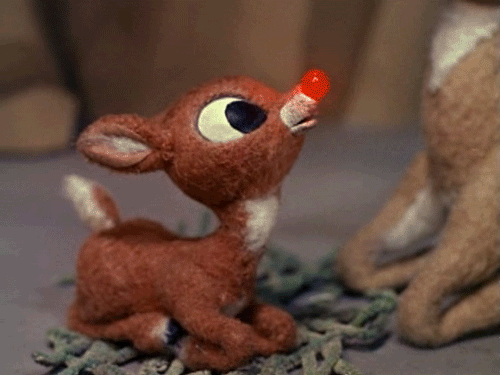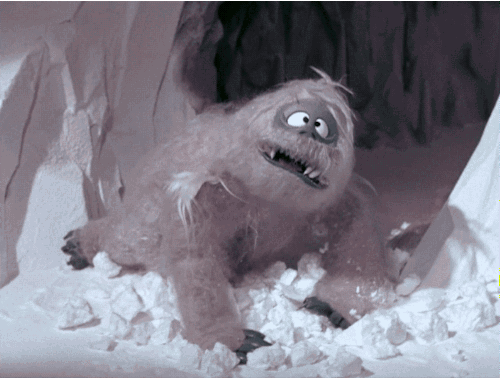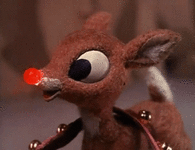 |
| I stocked up on Who gifs, too. |
In April I was chosen as a finalist in this contest, which meant I needed to finish a book by September 1. Said book was about 50 pages long and needed at least 450 more. But with school, graduation, and life in general swallowing most of my free time, I didn't really start work on it until late May (because life after college is definitely less busy, right?).
And after a mean season, that book is done. It's 160,000 words/800 pages long, and I made it in less than 100 days.
 |
| Pardon the dramatizing. I feel entitled to a bit of histrionic. |
Anyway, there's a longstanding human tradition of sending an expendable scout to find out how things look in an unfamiliar area. And somehow I don't think everyone reading this blog wants to do NaNoWriMo for three solid months.
 |
1. Inspiration will not do the work.
 |
| Those arms are not designed for heavy lifting. |
I used to think Inspiration came to those who wait, cause you can't rush art, and all that. The Muses are unpredictable, willful creatures. And everybody knows that if you chase a girl, she runs.
Stephen King disagrees. In his estimation, the Muse is a gruff, surly dude who lives in the basement and demands that you do all the work. The Muse thinks you're a cocky punk. He's got a bag of magic, but you won't even glimpse it until you prove you're not wasting his time.
2. "I'm too busy" Is. Not. Valid.
 |
| This is basically a Buzzfeed list. |
I spent a whole bunch of years "too busy" to write. The urgent tasks taking up my time: Netflix, imgur, and Facebook, mostly. I didn't need more time—even when I got it, I mostly flushed it online.
A teacher told me once that we almost never have time problems: we have time distribution problems. Maybe you have an absurdly exhausting, no-time-to-spare life; I wouldn't know.
What I do know is my own experience: between forty hours a week at the office, shopping for groceries, researching insurance agencies, moving into an apartment, figuring out a budget, registering the car, doing laundry, washing dishes, paying rent and utilities, and spending time with my wife, there was still time to write. It meant getting up at 5:30 every day. It meant writing during lunch. It meant not finding out what lunch items my peers had taken pictures of, postponing the Netflix queue, and refusing to self-anesthetize with pictures of cats. (Stunningly, the Internet did not vanish during my absence.)
Note: our apartment has no wifi, and writing there was far easier than writing at Starbucks.
3. Sacrifice free time, not family time.
There's exactly one thing I regret from this whole adventure: how poorly I treated my wife.
Not by being angry or snappish or impatient. Just absent. Nobody wants to share their spouse with a computer for the first two months of marriage. (Not for any months of marriage, I think.)
It took me a month and a half to figure out how much I was hurting her, because I am One Oblivious Dude. Take it from me: a dream that steals you completely away from the most important people in your life gets poisonous right quick.
4. Write. Every. Day.
 |
| I've never seen anyone do this after running. Ever. |
Exceptionally bad idea.
One break day turned into two, two turned into three, and when I got back to the manuscript I had to spend an hour just picking up speed. Momentum is the best advantage you can have in this first draft stage, I think; it's the only thing that got me over the hump.
Note: If I had this to do over again (and had a bit more leeway), there'd be one planned break day per week—not one or two break days when I felt like I needed it.
5. Perfect manuscripts don't get submitted.
 |
| This, but with sentences and periods and characters and DANG IT JUST START THE BOOK OVER |
I've self-identified as a writer for nearly 15 years and, in that time, have finished exactly two large-scale projects. Two. *
I suffer from a rare absurdly common affliction called perfectionism. Most of my writing projects lasted for about three chapters before I hit hard reset.
The truth is, I hate editing my own work with a powerful hate. I reasoned that if it wasn't perfect at the beginning, the errors would only pile up and by the end the manuscript would be a mess. Then I'd just have to spend more time editing.
Here's the deal, though.
- Perfect first drafts don't exist. Perfect manuscripts don't exist.
- While I'm tinkering, thumb-twiddling, and bemoaning the writing life like I've got nothing better to do (cf. #6 on this list), the deadlines have come and gone.
My work is never going to be as good as I want it to be, and that's okay, and obsessing over imperfection in a first draft is a poor excuse to leave so much unfinished.
Note: I don't want to communicate that writing very little is inherently shameful. Quite a few excellent authors like to take their time (Patrick Rothfuss's first draft took seven years, his revision another seven; Steven James rarely writes more than 120 words in an hour). My issue is that I had so much available time and energy and I did so little with it.
6. We're afraid of finishing.
 |
| My face for the last three months. |
Seth Godin calls it the lizard brain. It's the part of you that doesn't want to stand out from the crowd. The part that starts freaking right the heck out when the deadline comes close. The part that is deathly afraid of failure.
If you finish, you might submit, and if you submit then people could read it, and if they read it they might not like it, and if they don't like it then the townsfolk will riot and they'll beat down your door and come at you with pitchforks and torches and then the world will explode and EVERYONE WILL DIE.
It might not escalate quite that hugely, but the feeling is...kinda the same. It's not just writers who get nervous about people seeing their stuff. We're all afraid of failure. We hate failing more than we hate anything else.
7. Finish things anyway.
 |
| This is Neil, and he is right. |
Where creative work is concerned, nothing matters like finishing. Finishing is how we beat the lizard brain. The more we finish, the more we see that the villagers won't burn us alive for finishing.
So finish. Finish regularly. Finish something huge, something you're afraid of finishing. Your lizard will protest, and you'll want to stop and edit and revise and maybe start over. Finish.
After four years of college-level writing education, those five words on Gaiman's hand are still the best writing advice I've ever seen.
After four years of college-level writing education, those five words on Gaiman's hand are still the best writing advice I've ever seen.
Real Messes vs. Imaginary Masterpieces
The projects in our heads will always always always be better than what we make. There's friction between our dreaming and our forming; our real work will always be too heavy, too thick.
That sounds awful; in truth, it's freeing.
This summer, more than anything, I learned the value of real. The book I submitted is flawed (hugely, embarrassingly, unbearably flawed). But the flaws in something real can be mended. The flaws in something imagined can't even be seen.
And this is very, very real.
That sounds awful; in truth, it's freeing.
This summer, more than anything, I learned the value of real. The book I submitted is flawed (hugely, embarrassingly, unbearably flawed). But the flaws in something real can be mended. The flaws in something imagined can't even be seen.
And this is very, very real.











